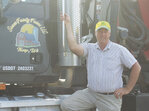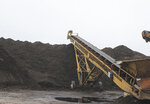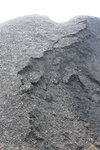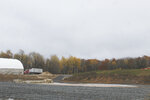



THORP, Wis. — When composting began at the Organic Waste Connections site in Thorp in 2020, Jeff Sauer had no idea where the venture would take him or how the service would prove to be one so needed and valuable throughout the Upper Midwest.
Since its inception, OWC has experienced exponential growth, Sauer said, and that growth has come with growing pains that Sauer and his team are working to remedy.
“We had no clue the amazing need that is out there for this service,” Sauer said. “How do you plan for growth you don’t even know you’ll have?”
OWC was the first business of its kind in the U.S. and remains one of just a few commercial livestock composting sites in the country. Sauer uses a variety of organic materials to create a compost that he is starting to farmers as a soil amendment to help create and improve soil health and biodiversity.
Compost is created at OWC using materials such as feed refusals, waste hay and manure from local farms and wood byproducts from area sawmills, along with livestock mortalities, which are all composted together to create the soil-nourishing compost.
“It really is the ultimate in upcycling,” Sauer said. “We are taking all of these things that are otherwise difficult to dispose of and turning it into something that is not only useful, but valuable for the environment.”
With no similar business model to learn from and emulate, Sauer said, navigating all of the changes and growth of the business has been a process of trial and error.
“We are simply learning as we are going,” Sauer said. “This is a constantly changing business, and we take a great deal of pride in the role we play in maintaining, protecting and improving the environment.”
With that rapid growth, Sauer said, his team is essentially building and creating a completely new and redesigned composting facility.
“We are building a site where we can operate through all types of weather, such as with our challenges when it is muddy like this, with the rains we see in the spring and fall,” Sauer said. “All of this is to ensure that we are protecting the environment that we rely on.”
Improvements being made to the OWC site include bringing electricity to the site and building an office facility as well as adding a retention pond and hard-surfacing much of the working area.
“We are putting in a heat recovery system to recover the heat given off by the compost,” Sauer said. “The product in the finished piles will stay 120 to 140 degrees year-round. It will never cool off.”
Continually updating and improving the compost site is only half of the work facing Sauer and his team.
“The other big job we have facing us is conveying the message to farmers, the benefits of the compost we are creating,” Sauer said. “We are seeing some pretty amazing crop results from the compost this year.”
OWC compost has been approved for use by the Midwest Organic Services Association.
One of Sauer’s favorite examples of crop success is located near the OWC composting site.
“This young guy has never been able to grow a crop of soybeans on this field because the ground was just bad; he has just been doing corn, back-to-back,” Sauer said. “I asked him to do a trial, and he spread compost across part of the field and planted beans. He was so excited; he harvested 56 bushels to the acre on that field from which he’d never been able to get a crop of beans, after just one year of applying compost.”
As great as the results have been in the trials Sauer’s team have been conducting on traditional agricultural crops, they have been equally as great for other crops.
“My sister-in-law grew a 2-pound potato this year,” Sauer said. “We believe potato producers would benefit from this, too, especially if they are what we call organic producers.”
Compost produced at OWC is nutrient dense, with analysis reports coming in at over 15 pounds of total nitrogen per ton, 18 pounds of phosphorous and 53 pounds of potassium.
“The nutrients are a plus, but where the real benefit comes in is the organic matter and the diverse microbiology present in the compost,” Sauer said. “The real value of the compost comes in how it can impact and build the soil year after year, continually improving and growing it.”
That point is where Sauer said he finds his satisfaction.
“Some might have the misconception that what we are doing here at OWC is negatively impacting the environment, but it is quite the opposite,” Sauer said. “As farmers, everything about the environment — the water, the soil, the air — it is all vitally important to our livelihoods, and we are doing what we can to protect, improve and enhance that in any way possible.”
Comments
No comments on this item Please log in to comment by clicking here